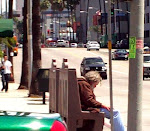 "Watching his son at the age Steve was when he was abused, he realized how innocent he was, how naïve he was. How little the kid understood about sexuality at that age, what this priest did to me and the way he groomed me. He said, I just had no tools to deal with that at that age. And what it did was it removed the guilt. It wasn’t my fault, he thought, it removed the guilt."
"Watching his son at the age Steve was when he was abused, he realized how innocent he was, how naïve he was. How little the kid understood about sexuality at that age, what this priest did to me and the way he groomed me. He said, I just had no tools to deal with that at that age. And what it did was it removed the guilt. It wasn’t my fault, he thought, it removed the guilt."(We move slowly. Last summer City of Angels interviewed Kelly Clark, Portland, Oregon, attorney who has handled clergy sex abuse cases for more than a decade. I asked him about the phenomenon, of recovering memory when your own child reaches the age of the suppressed trauma. Here is the transcript and video, it took me this long to get it cleaned up for post...)
Q ; Thanks for talking to me today. In a lot of clergy sex abuse cases recovered memory happens when a victim’s child turns the age the victim was when they were molested. They suddenly remember. you've had a couple of cases where that's been part of the story. Can you talk about that.
KELLY CLARK : Sure the first incident I handled. Steve testified that when he was about twelve or thirteen, which is the age he was when he began to be groomed and abused- when he saw his son turn that age, he started thinking realizing he had always blamed himself for the abuse. He thought, I should have said something, I should have stopped it, I should have resisted.
Steve said, when I started looking at my son who was that age I started thinking, he’s just a kid. He doesn't have responsibility. If somebody came on to him sexually, that's not his fault, it wouldn't be his fault. And, and he realized, maybe it wasn’t my fault. And that was when he began to, to think that I should do something about this.
Q ; It was when his child what, what age was when- what happened, his child turned 12 13 and what did he do?
(Here is video, transcript continues below)
.
KC : He said he was just looking at him one day thinking about how innocent his kid was and, uh, and naïve in some ways. And then he started thinking, well wait a minute that's the age I was when I was abused. And the kid wasn’t at fault.
Q ; Mm-hmm and he came to you?
KC : It was one of the things that led him to me eventually. That, also a, a meditation group at his local church where he finally for the first time ever talked to people who had been. Anyway, he went to a, a counselor, he eventually went to the archdiocese, they agreed to pay for his counseling - then he- I have a case we're about to file [OVERLAPPING CONVERSATION] church with the same dynamic, where the gentleman is still in his early forties, I think, and he had a couple of sons and they are about the same age. They are about twelve - [TECHNICAL]
Q : We were talking about delayed discovery where the crime victim looks at their child and thinks, that child is the same age I was -
KELLY CLARK : The delayed discovery in the age of the child and all that.
Q : Because it’s something that happened in my case when my daughter turned five years old.
KC: There’s a whole contingency I think, Kay, between pure repressed memory, where a person has no memory whatsoever and something happens and all of a sudden they remember and what I call Suppressed memory, which is where the never forget what happened, but they don't think about it. They push it out of their mind, put it on the back shelf, and they're just never going to think about it.



There’s a whole continuum in between there. Some people remember that they were abused but they don't remember the details. Some remember portions of their abuse but not all of it. Some people remember it all but they never think about it. And some people don't remember any of it until something happens. I call, I call it all a trigger.
If, if you see your daughter at age five and begin to think about what happened to you and your memory starts to come back, if a person who has never forgotten their abuse all of a sudden drives by their old church by chance and they start to think about it, even though they've always remembered it, they begin to sort of process.
A classic situation is where a person is in, for example in marital counseling. Or drug and alcohol rehab. They're filling out the checklist and it says are you a child abuse victim, yes, and the counselor says tell me about this. And they start talking about it. And the counselor says, you've got to look at this, this is a big deal. And that's the point at which the person begins to process that happened to them.
***********
There are various places on that continuum of recovered memory
****************
KC: I had one client say he was a very successful young law enforcement officer, and he said how could it have damaged me. I’m successful, I'm a cop, I have a beautiful wife and four beautiful kids, I wasn’t damaged. And then I began, five years later I began to look at the fact that I really was damaged. But he was just kind of in denial. There’s all various places on that continuum on repressed, suppressed memory. Various things can trigger it, including, as I said with Steve, and the other gentleman that I'm representing now, watching their own children at the age at which they were abused.
Q ; That was very similar, the two clients have really similar stories? Can you tell what the story is in both cases.
KC : Well the first one was Steve who was abused by a Catholic priest named Mel Bucher, at St. Anthony’s Franciscan parish in Oregon. The second is a client in a case that we've not yet filed, so I don't want to name the church. It’s not the Catholic Church. It’s a different church, and he was one of three boys, three brothers that were all abused by the same perpetrator.
And he, his abuse started I think when he was twelve or thirteen. And one of his sons is now twelve or thirteen and that's what got what happened to him.
Q : What had happened when his son turned 12-13?
KC : You know, he just simply said, basically part of what brought him to call me was thinking more about his own abuse. And of watching his son who is now the age he was when he was abused. He didn't go into a lot of detail about what went on beyond that.
Q ; Seeing his son and thinking he was so innocent?
KC : Yeah, that was Steve’s story, just how innocent he was, how naïve he was. How little the kid understood about sexuality at that age, and then he speaks of, you know, what this priest did to me and the way he groomed me and all that and he said, I just had no tools to deal with that at that age. And what it did was it removed the guilt. [OVERLAPPING CONVERSATION] It wasn’t my fault.
******
It removed the guilt
*************
Q ; Up to that point he felt -
KC : It was my fault. I was a big kid, I was fourteen years old, I could have pushed him away, why didn't I do that. I must have liked it, it must be my fault. And he sees his own son and he goes, no, no-no-no. That's not what happens when you're thirteen or fourteen. So that was that story.







No comments:
Post a Comment